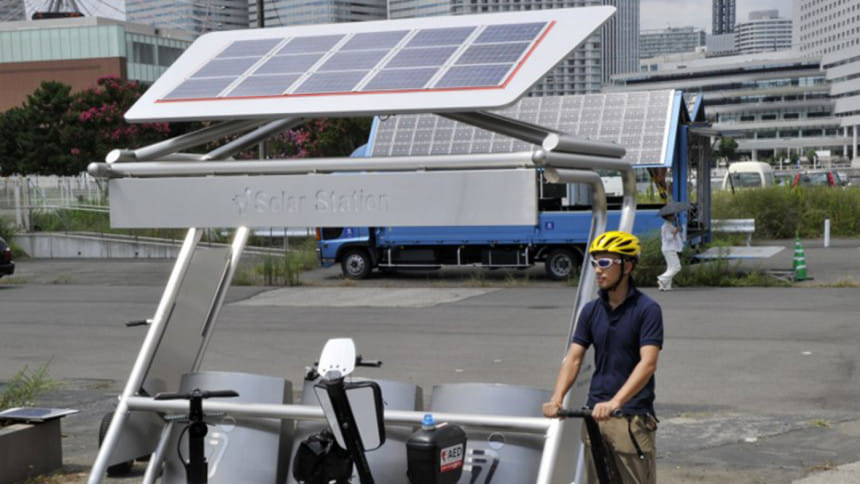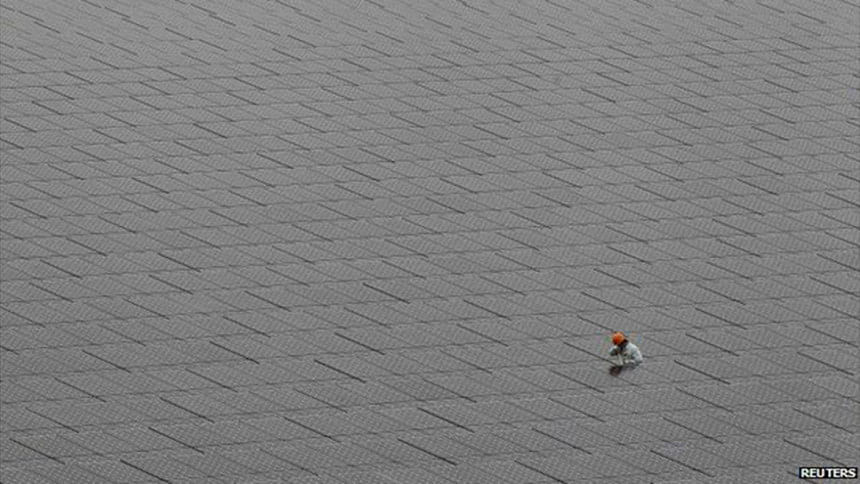Japan's renewable revolution at risk

Could Japan survive without nuclear power? The short answer to that question is yes.
Japan has been surviving surprisingly well without nuclear power for the last four years. Following the Fukushima disaster in March 2011 all of Japan's 48 other nuclear reactors were shut down. The predicted blackouts did not happen, the country kept running just fine.
But there has been a cost. Prior to the Fukushima disaster nearly 30% of power came from nuclear. That has been replaced by burning lots more coal and gas - Japan is now the world's biggest importer of liquefied natural gas.
#Japan: Clean Energy Including #Solar And #Hydro Will Edge Out #Nuclear Before 2030 http://t.co/UZHBTDDHKD #climate pic.twitter.com/FI4WWtN0P8
— Assaad Razzouk (@AssaadRazzouk) April 28, 2015
It also means that since 2011 Japan's greenhouse gas emissions have climbed significantly.
Higher fuel bills and higher emissions are bad for Japan, bad for the planet. Prime Minister Shinzo Abe's answer? Turn the nuclear plants back on.
But in the four years since the nuclear plants were shut down, Japan has also begun to witness something else - a renewable energy revolution. And the return to nuclear power may be putting that under threat.
Japan is a mountainous island nation with a sunny climate and lots of active volcanoes. In other words there are lots of potential ways to generate renewable energy - hydro, wind, tidal, solar and, the big one, geothermal.
And yet prior to 2011, just 9% of Japan's power came from renewables - and almost all of that from hydropower. Only 1% came from solar.
But desperate times called for desperate measures. Following the Fukushima disaster, the Democratic Party government enacted a "feed-in tariff".

Anyone could put solar panels on their roof, connect up to the grid and the power companies would be required to pay them a generous 40 Yen per kilowatt.
The response was dramatic. Money poured in to solar, and not just on people's rooftops. In 2011 Japan had just 4.9 gigawatts of installed solar capacity. Just three years later, at the end of 2014, that had leapt to 23GW. It put Japan ahead of Italy as the number three solar energy producer in the world.
In November 2013 electronics giant Kyocera began producing power from Japan's biggest solar array so far, nearly 1.5 square kilometres of panels built on the site an old shipyard in Kagoshima bay. It can produce 70MW of power, enough to power more than 20,000 homes.
That is just the beginning. The company has plans to build a 430MW plant on one of Japan's many offshore islands, big enough to power 130,000 homes.
It's all great news, except it has all suddenly ground to a halt.
At the end of last year Japan's big power companies began telling solar producers they could take no more electricity from them. At the same time the government dropped the price utilities would have to pay for electricity from new solar to 27 Yen per kilowatt.
Suddenly the calculus for building more solar has been put in serious doubt.
No-one is suggesting a conspiracy. But the timing is significant.
In the face of widespread opposition, the Abe government is pushing ahead with a return to nuclear power. His most persuasive argument for doing so is that Japan needs the cheap reliable "base load" power that only nuclear can provide.
That claim flies in the face of scientific evidence that Japan could greatly increase its output from renewable sources. Japan's geothermal potential is huge. It has 119 active volcanoes. Geothermal is cheap, reliable and works 24 hours a day.
But so far only a tiny fraction of it is being exploited.
It is odd that at the same that it is focusing so much time and energy on a return to unpopular and risky nuclear power, the Japanese government's policy on renewables appears to be in such complete disarray.

 For all latest news, follow The Daily Star's Google News channel.
For all latest news, follow The Daily Star's Google News channel. 



Comments